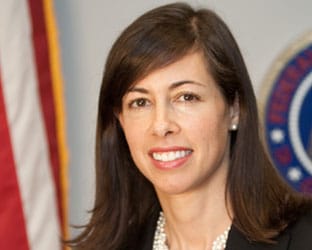She’s back … and she’s got some words for FCC Chairman Ajit Pai and Republican Commissioners Brendan Carr and Michael O’Rielly on a variety of concerns that the GOP-controlled agency has, or seeks, to push through in the post-Tom Wheeler era.
Democratic FCC Commissioner Jessica Rosenworcel offered her thoughts on such wide-ranging subjects as Next Gen TV and the restoration of the “UHF Discount” in the context of Sinclair Broadcast Group‘s proposed merger with Tribune Media.
She did so Wednesday at perhaps the most unlikeliest of venues: The U.S. Conference of Catholic Bishops.
Noting her time away from the FCC and her “unusual honor of heading back” to the Commission, Rosenworcel said, “It’s trite but true that a little distance provides perspective, because in my time away, one thing became abundantly clear: The future belongs to the connected. No matter who you are or where you live in this country, you need access to modern communications for a fair shot at 21st century success.”
Acknowledging the crowd, Rosenworcel touched on her own beliefs by saying, “We share the belief, common to both Catholic Social Teaching and the Jewish tradition of Tikkun Olam, that a little ruckus in service of human dignity and the common good is a good thing. So. let me make a little ruckus today. I’ll start—and get right into it—with net neutrality.”
Thus began Rosenworcel’s empassioned defense of net neutrality.
“Even though our net neutrality policies are now legally viable and wildly popular, the leadership at the Commission wants to revisit Internet openness,” she said. “It has started a proceeding that tears at the legal foundation of net neutrality. It has proposed cutting the rules we have and instead offering our broadband providers the power to favor sites, content, and ideas; the power to discriminate with our traffic; and the power to become censors and gatekeepers for all that is online. This is worrisome.”
The U.S. Conference of Catholic Bishops has expressed concern about the Commission “dismantling” net neutrality, Rosenworcel added.
Rosenworcel then assailed her agency for restoring the “UHF discount,” which slashes in half the reach of a TV station that airs between Channels 14 and 69, allowing a company much greater national reach.
She said, “Before I returned to the Commission, the agency inexplicably resurrected an outdated and scientifically inaccurate system for tallying station ownership, known as the UHF discount. It also reversed an effort to investigate joint sales agreements. Both steps helped speed the way for this transaction—which would combine two broadcasting giants: Tribune and Sinclair.
“I’m not alone in my concerns about the concentration that will result from this proposed transaction,” Rosenworcel continued. “I’m not alone in my fear that it will do harm to the time-tested principles of diversity, localism, and competition. There is opposition across the political spectrum. In fact, I can’t put it better than the Newsmax Group, which has warned that a ‘free and diverse press, a bedrock principle of American democracy,’ will be irreparably harmed by this merger. The bottom line is we are not going to remedy what ails our media with a rush of new consolidation. We are not going to fix our inability to ferret fact from fiction by doubling down on a single company owning ever more of our public airwaves.”
At this point, Rosenworcel aimed her frustration at ATSC 3.0, the Next Gen TV standard. She said, “I fear the agency is about to rush this standard to market without understanding the consequences for consumers. This new standard is not backwards-compatible with current television devices. In the near term, with the standard voluntary, the cost of implementing it will be added to consumer cable and satellite bills. In the longer term, it means everyone will need to buy a new television set.”
The NAB on Thursday responded to Rosenworcel, with EVP/Communications Dennis Wharton saying Rosenworcel “misunderstands the goals and asks of broadcasters. We simply want to compete on equal footing with national wireless and pay TV providers who routinely upgrade services in the telecom ecosystem.”
Wharton added that Next Gen TV “will allow local TV stations – including our public TV brethren – the ability to offer ultra HDTV programming, emergency alerts that save lives, and live TV on mobile devices. This will be a free and local programming innovation that the FCC routinely supports, and that tens of millions of consumers will enjoy.”





